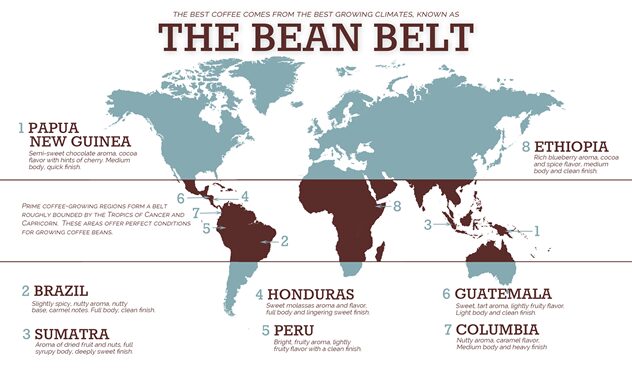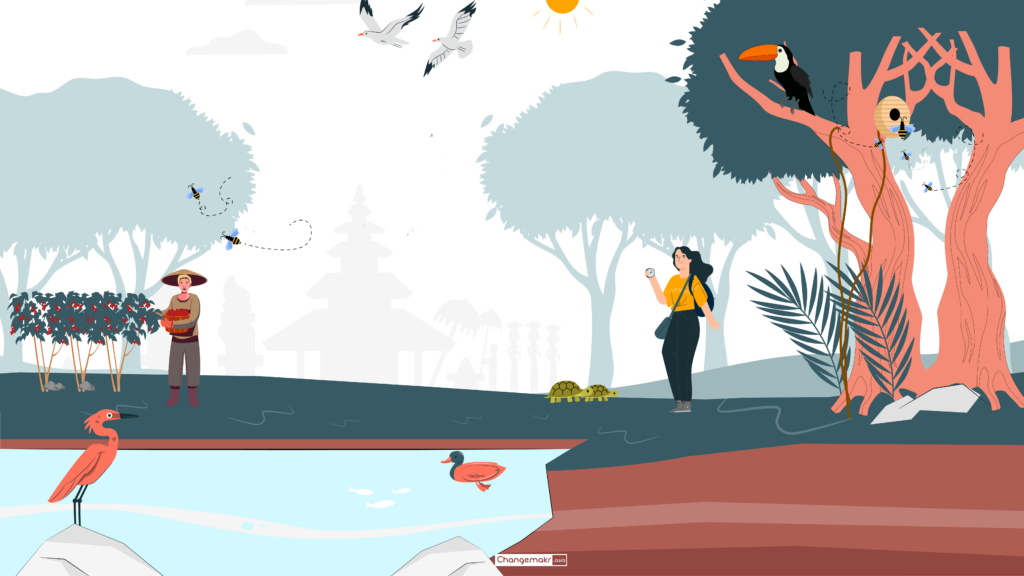Hint : Enjoy your morning cup of coffee on the patio and listen to the songbirds. There’s a connection between the two.
Here’s the fact : there are 1.7 million different species on earth and together, they form our current ecosystem. Mankind, fortunately or unfortunately, depends on ecosystems which depends on biodiversity. The United Nations has proclaimed May 22 The International Day for Biological Diversity(IDB) to increase understanding and awareness of biodiversity issues. So under the slogan “We’re part of the solution”; find out how carefully choose your next cup of java could benefit the birds habitat, vegetation; hence greater biodiversity.
ECOSYSTEMS X MANKIND
Ecosystem posses qualities essential mankind. Healthy ecosystems clean our water, purify our air, maintain our soil fertility, regulate the local climate, store carbon, buffer us against natural hazards, recycle nutrients and provide us with food.They are at the foundation of all civilisation and sustain our economies. It’s that simple: we could not live without these “ecosystem services”. They are what we call our natural capital.
Biodiversity is the key indicator of the health of an ecosystem. A wide variety of species will cope better with threats than a limited number of them in large populations. Even if certain species are affected by pollution, climate change or human activities, the ecosystem as a whole may adapt and survive. But the extinction of a species may have unforeseen impacts, sometimes snowballing into the destruction of entire ecosystems.
COFFEE FARM : FROM BIRD PARADISE TO A MONOCULTURE
Take coffee for example. It’s the beverage that many of us rely on to galvanize us into action in the morning. But coffee is so much more than just a drink. Coffee is the second most traded commodity in the world, acting as the primary export for many developing economies in this region.
Traditionally, coffee is typically cultivated in tropical and subtropical areas at high elevations, often in rugged mountainous areas, and naturally grows under a shaded canopy of trees. Traditional coffee is often integral to agroforestry systems in which tree species are cultivated together with coffee and other agricultural commodities. These regions are home to many different floras that contribute to high biodiversity levels. The sheltering from canopies also provides a valuable habitat for indigenous animals and insects, as well as preventing topsoil erosion; hence removing the need for chemical fertilisers.

Due to increased market demands in recent years, this innocuous form of agriculture has been superseded by sun cultivation techniques. Sun-grown coffee is produced on plantations, where forestry is cleared so that coffee is grown in rows as a monoculture with no canopy. Sun-grown coffee, in concert with the necessary addition of fertilizer, creates the highest yield of coffee, but eliminates the diversity of plants which support an array of insects and animals, posing detrimental impacts to the biodiversity of the region, as well as other environmental harms.
This change has profound effects on the species richness and abundance that the landscape can support and the environmental services that can be provided, including soil erosion, pollination, and water clarification.
A SUSTAINABLE ALTERNATIVE ? SHADE GROWN COFFEE
When it comes to biodiversity, how coffee is grown matters more than the variety of beans being cultivated.
Shade grown coffee farm can imitate a native forest, which allows many different varieties of bird, plants, insects to thrive in its lush growth.
Surrounding shady fruit trees assist in creating s bird-friendly habitat – and the more birds that are able to thrive in a coffee forest, the better. This primarily because birds can help deter pests from the growing coffee plants. Not only does shade-grown coffee provide a habitat for many bird species, but they also return the favour by protecting the precious plants.
Shade-grown coffee farms also require little or no chemical fertilisers, pesticides, or herbicides. The shade trees filter carbon dioxide which causes global warming, and aid in soil moisture retention which minimises erosion. This promotes a healthier environment and helps sustains rainforests. it would appear that everybody wins.
By carefully choosing your next cup of java could benefit the birds habitat, vegetation and greater biodiversity. Because the loss of biodiversity will be the downfall of mankind.
The article was initially published on May 22 2021.
Also Read :
Wanted : Serious Collaboration For Net Zero ! Join Techstars Challenge



